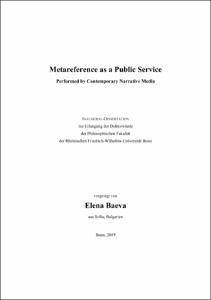Baeva, Elena: Metareference as a Public Service : Performed by Contemporary Narrative Media. - Bonn, 2019. - Dissertation, Rheinische Friedrich-Wilhelms-Universität Bonn.
Online-Ausgabe in bonndoc: https://nbn-resolving.org/urn:nbn:de:hbz:5-54750
Online-Ausgabe in bonndoc: https://nbn-resolving.org/urn:nbn:de:hbz:5-54750
@phdthesis{handle:20.500.11811/8146,
urn: https://nbn-resolving.org/urn:nbn:de:hbz:5-54750,
author = {{Elena Baeva}},
title = {Metareference as a Public Service : Performed by Contemporary Narrative Media},
school = {Rheinische Friedrich-Wilhelms-Universität Bonn},
year = 2019,
month = jun,
note = {Building on decades' worth of research by scholars such as L. Hutcheon, W. Nöth, A. Nünning, I. O. Rajewsky, P. Waugh, W. Wolf and others on the topics of self-reference, metafiction and metanarration, this transmedial study aims to demonstrate that far from being "narcissistic narrative[s]" (Hutcheon), many contemporary metareferential works attempt to perform a public service, namely that of educating the general public.
For the purpose of this demonstration, the present doctoral thesis first provides a critical analysis of both the early and the current terminology used in the study of metareference, as well as an in-depth discussion of the functions and effects traditionally ascribed to the use of metareference, both in fiction in general and in specific media. Building on this theoretical foundation, this dissertation subsequently proceeds to examine eleven contemporary works from five different narrative media, all of which utilise numerous different types of metareferences to achieve their ultimately didactic goal of raising their audience's medium-awareness, specifically in regards to the role the respective medium plays in society.
Within the medium of literature, this study analyses I. McEwan's Atonement (2001) and M. Zusak's The Book Thief (2007), and focuses predominantly on the roles language and literary tropes, reading and writing are shown to play in shaping not only our individual identities, memories, beliefs and perceptions but also our cultural memory and societal norms.
The section dedicated to the medium of film discusses E. E. Merhige's Shadow of the Vampire (2000) and M. Scorsese's Hugo (2011) – two very different takes on the nature, magic and social impact of cinema.
Within the medium of television, this doctoral thesis analyses A. Sorkin's Sports Night (1998-2000), Studio 60 on the Sunset Strip (2006-2007) and The Newsroom (2012-2014), all the while focusing especially on Sorkin's idealistic portrayal of the positive role television could play in our society as a major source of both information and entertainment if only the television industry would rally around the medium's potential.
The chapters on the medium of computer games examine 2K's BioShock (2007), Yager's Spec Ops: The Line (2012) and Galactic Cafe's The Stanley Parable (2013), all three of which showcase the uniquely experiential and interactive way in which games can provide social and cultural commentary, especially on matters such as choice and agency.
Finally, within the medium of online video, this study analyses H. Green's and B. Su's webseries adaption of J. Austen's Pride and Prejudice (1813), The Lizzie Bennet Diaries (2012-2013), which provides a nuanced commentary on the social significance, pitfalls and benefits of new media.},
url = {https://hdl.handle.net/20.500.11811/8146}
}
urn: https://nbn-resolving.org/urn:nbn:de:hbz:5-54750,
author = {{Elena Baeva}},
title = {Metareference as a Public Service : Performed by Contemporary Narrative Media},
school = {Rheinische Friedrich-Wilhelms-Universität Bonn},
year = 2019,
month = jun,
note = {Building on decades' worth of research by scholars such as L. Hutcheon, W. Nöth, A. Nünning, I. O. Rajewsky, P. Waugh, W. Wolf and others on the topics of self-reference, metafiction and metanarration, this transmedial study aims to demonstrate that far from being "narcissistic narrative[s]" (Hutcheon), many contemporary metareferential works attempt to perform a public service, namely that of educating the general public.
For the purpose of this demonstration, the present doctoral thesis first provides a critical analysis of both the early and the current terminology used in the study of metareference, as well as an in-depth discussion of the functions and effects traditionally ascribed to the use of metareference, both in fiction in general and in specific media. Building on this theoretical foundation, this dissertation subsequently proceeds to examine eleven contemporary works from five different narrative media, all of which utilise numerous different types of metareferences to achieve their ultimately didactic goal of raising their audience's medium-awareness, specifically in regards to the role the respective medium plays in society.
Within the medium of literature, this study analyses I. McEwan's Atonement (2001) and M. Zusak's The Book Thief (2007), and focuses predominantly on the roles language and literary tropes, reading and writing are shown to play in shaping not only our individual identities, memories, beliefs and perceptions but also our cultural memory and societal norms.
The section dedicated to the medium of film discusses E. E. Merhige's Shadow of the Vampire (2000) and M. Scorsese's Hugo (2011) – two very different takes on the nature, magic and social impact of cinema.
Within the medium of television, this doctoral thesis analyses A. Sorkin's Sports Night (1998-2000), Studio 60 on the Sunset Strip (2006-2007) and The Newsroom (2012-2014), all the while focusing especially on Sorkin's idealistic portrayal of the positive role television could play in our society as a major source of both information and entertainment if only the television industry would rally around the medium's potential.
The chapters on the medium of computer games examine 2K's BioShock (2007), Yager's Spec Ops: The Line (2012) and Galactic Cafe's The Stanley Parable (2013), all three of which showcase the uniquely experiential and interactive way in which games can provide social and cultural commentary, especially on matters such as choice and agency.
Finally, within the medium of online video, this study analyses H. Green's and B. Su's webseries adaption of J. Austen's Pride and Prejudice (1813), The Lizzie Bennet Diaries (2012-2013), which provides a nuanced commentary on the social significance, pitfalls and benefits of new media.},
url = {https://hdl.handle.net/20.500.11811/8146}
}






